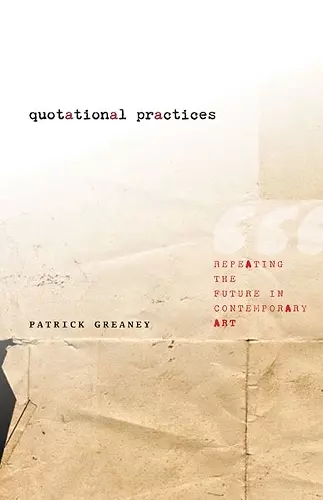Quotational Practices
Repeating the Future in Contemporary Art
Format:Paperback
Publisher:University of Minnesota Press
Published:1st Mar '14
Currently unavailable, and unfortunately no date known when it will be back

Literature and art have always depended on imitation, and in the past few decades quotation and appropriation have become dominant aesthetic practices. But critical methods have not kept pace with this development. Patrick Greaney reopens the debate about quotation and appropriation, shifting away from naïve claims about the death of the author. In interpretations of art and literature from the 1960s to the present, Quotational Practices shows how artists and writers use quotation not to undermine authorship and originality, but to answer questions at the heart of twentieth-century philosophies of history.
Greaney argues that quotation is a technique employed by art and philosophy to build ties to the past and to possible futures. By exploring quotation’s links to gender, identity, and history, he offers new approaches to works by some of the most influential modern and contemporary artists, writers, and philosophers, including Walter Benjamin, Guy Debord, Michel Foucault, Marcel Broodthaers, Glenn Ligon, Sharon Hayes, and Vanessa Place.
Ultimately, Quotational Practices reveals innovative perspectives on canonical philosophical texts as well as art and literature in a wide range of genres and mediums—from concrete poetry and the artist’s book to performance, painting, and video art.
"Patrick Greaney’s argument that we might understand history as a sort of utopian subjunctive is provocative and perfectly pitched. This is the kind of book the most ambitious critic aspires to write." —Craig Dworkin, author of No Medium
"In this groundbreaking and provocative study of the practice of quotation at the heart of contemporary conceptual writing and art, Patrick Greaney challenges the view that the use of quotation spells the end of authorship, of the individual voice. On the contrary, he argues, quotation must be understood in its historical function, its questioning of the past’s unrealized possibilities—possibilities for the present and even the future. Laying to rest once and for all the notion that citing the texts of others is little more than inspired plagiarism, Greaney provides a fascinating study of a philosophical practice that he calls, after Foucault, ‘the frugal lyricism of quotation.’" —Marjorie Perloff, author of Unoriginal Genius: Poetry by Other Means in the New Century
ISBN: 9780816687381
Dimensions: 216mm x 140mm x 25mm
Weight: unknown
224 pages